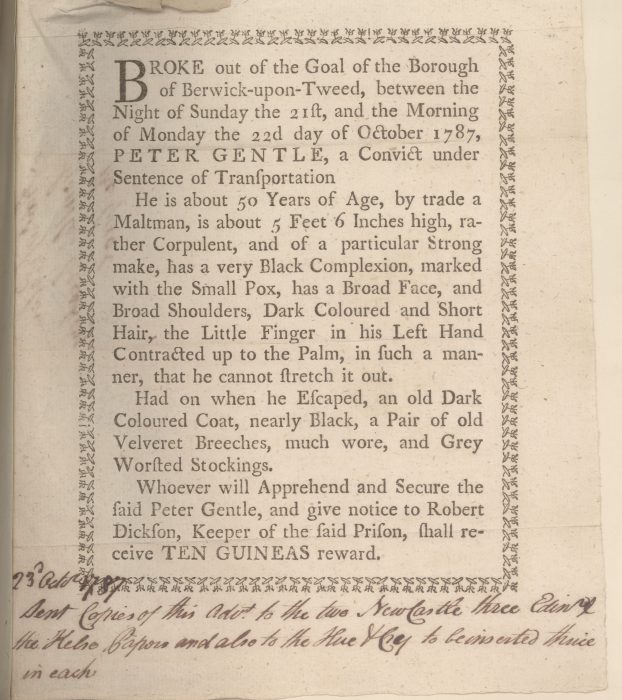Wanted poster for Peter Gentle, 1787
Reference: BA/G/2/10/44
Suggested age groups: KS2, KS3, KS4, lifelong learners
Subject areas: History, Maths, Literacy, Art
CONTEXT
Berwick Quarter Sessions court was a Royal Court of Justice that was held four times a year in the town. In most places assizes courts tried more serious crime such as murder, rape and highway robbery and were held twice a year. However, Berwick had the right to try these serious cases and impose the death penalty at its Quarter Sessions. In the 1730s petty sessions courts were introduced to try minor (or petty) crimes.
Berwick Quarter Sessions tried Peter Gentle in 1787. He was accused of stealing oats and barley from his employer. Margery Thompson, of Spittal, told the court that Peter had tried to sell her some of the grains. Gentle claimed that Thompson was mad and that he was not guilty.
The court found Peter guilty and sentenced him to transportation. As this notice shows, he broke out of the Berwick jail on 23 October 1787. A 10 guinea reward was offered for his capture.
The notice of Peter’s escape appeared in both Newcastle and Edinburgh newspapers, but we do not know if he was recaptured.
Before 1971 Britain used pounds (£), shillings (s) and pence (d). 12 pence were equal to 1 shilling and 20 shillings were equal to 1 pound. In this advertisement the reward was offered in guineas; 1 guinea was equal to £1 and 1 shilling. 10 guineas in 1787 is worth over £1500 in 2020.
ACTIVITIES
ACTIVITY 1
Background
Berwick Quarter Sessions court was a Royal Court of Justice that was held four times a year in the town. In most places assizes courts tried more serious crime such as murder, rape and highway robbery and were held twice a year. Berwick Quarter Sessions tried Peter Gentle in 1787. He was accused of stealing oats and barley from his employer.
SEE
See: What was the Berwick Quarter Sessions court?
See: What types of crimes were tried at assizes court?
See: What types of crimes did Berwick have the right to try?
See: What was Peter Gentle accused of?
See: What did the court sentence Peter Gentle to?
See: When did Peter Gentle escape?
THINK
Think: What was transportation?
Think: When was transportation used?
Think: Why was transportation used?
Think: What crimes was transportation used as a punishment for?
Think: Where were criminals sent and what did they do while they were there?
DO
Do: Look at the Berwick Friends website for inspiration and create a piece of creative writing from Peter Gentle’s perspective as he broke out of Berwick jail.
Resources
https://ourcriminalancestors.org/source-guide-for-tracing-your-transported-convict-ancestorss/
https://www.bbc.co.uk/bitesize/guides/z938v9q/revision/4
https://www.thehistorypress.co.uk/articles/the-land-of-the-free-criminal-transportation-to-america/
http://www.berwickfriends.org.uk/wp-content/uploads/2019/10/Peter-Gentle.pdf
ACTIVITY 2
Background
The way we write letters, and the words and phrases we use, evolve over time. The lower-case letter “s” in the article looks like the letter “f”. This is typical of the time.
SEE
See: Which words in the notice are unfamiliar to you?
See: Which letters in the article look different to how we would write letters today?
THINK
Think: What is typography?
Think: Why do words change over time?
Think: Why does handwriting change over time?
DO
Do: Create a word bank of all the words that are unfamiliar to you. Write a definition of each word. Can you illustrate it to show what the words mean?
Do: Create an image of Peter Gentle based on the description in the article.
Do: Write a description of Peter Gentle replacing the 18th Century words with language that we would use today.
Do: Can you read the handwriting at the bottom of the article? Create a newspaper article about Peter Gentle’s escape. Can you write this in an old-fashioned handwriting style?
Resources
ACTIVITY 3
Background
Before 1971 Britain used pounds (£), shillings (s) and pence (d). 12 pence were equal to 1 shilling and 20 shillings were equal to 1 pound. In this advertisement the reward was offered in guineas; 1 guinea was equal to £1 and 1 shilling. 10 guineas in 1787 is worth over £1500 in 2020.
SEE
See: How much money was being offered as a reward for anyone who captured Peter Gentle?
See: What is a guinea in monetary terms?
THINK
Think: What units of currency were used in Britain during the 1700s?
Think: When did Britain change to using the decimal currency system that we currently use?
DO
Do: Can you work out what the equivalent of the reward would be today giving consideration to inflation?
Do: How much is one guinea worth today?
Do: Using the National Archives currency convertor, can you work out how many days wages the reward money is equal to?
Do: Do cash rewards actually help catch criminals? Research how effective this is. Can you use percentages and charts to show how often people claimed cash rewards for catching criminals during the Victorian period and how successfully this is used today?
Resources
OTHER ONLINE RESOURCES
Transportation
Our Criminal Ancestors website (University of Hull), page about researching transported criminals: https://ourcriminalancestors.org/source-guide-for-tracing-your-transported-convict-ancestorss/
BBC Bitesize website, page about transportation:
https://www.bbc.co.uk/bitesize/guides/z938v9q/revision/4
The History Press website, page about transportation to America:
https://www.thehistorypress.co.uk/articles/the-land-of-the-free-criminal-transportation-to-america/
Peter Gentle
Berwick Advertiser website, page about crime and punishment talk including Peter Gentle: https://www.berwick-advertiser.co.uk/news/latest-news-friends-berwick-and-district-museum-411245
Friends of Berwick and District Museum and Archives website, page for creative writing project (including piece about Peter Gentle):
http://www.berwickfriends.org.uk/record-office/projects/stories-of-crime-and-punishment/
Crime and punishment in Berwick
Northumberland Archives website, page for crime and punishment in Berwick: https://northumberlandarchives.com/exhibitions/Berwick_in_10/5.html
Money
Bank of England website, page for historic inflation calculator (you can work out how much historic amounts are worth now):
https://www.bankofengland.co.uk/monetary-policy/inflation/inflation-calculator


